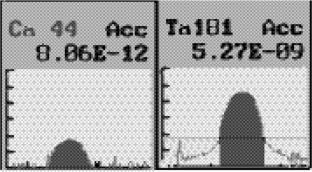Molecular Ion Spectra in Glow Discharge Mass Spectrometry of Toxic and Physiologically Active Elements in Hydroxyapatite
Abstract
Mass spectra of molecular ions in the cathode sputtering of hydroxyapatite within argon glow discharges were studied experimentally and through mathematical simulation. The study was aimed at developing a highly sensitive technique for the determination of toxic and physiologically active elements in hydroxyapatite, used for medical purposes, by glow discharge mass spectrometry. Mass spectra were simulated employing the method developed previously for the calculation of molecular ion concentrations in glow discharge plasma and the computer program for its implementation. The effective equilibrium constants were refined for the formation–dissociation reactions of molecular ions during cathode sputtering of hydroxyapatite on a tantalum substrate. Comparison between the experimental and calculated mass spectra confirmed that the model was accurate. The study revealed molecular interferences in the mass range from 19F to 238U that were not adequately separated from the isotopes under study, thus reducing the analysis detection limit. The isotopes that were minimally affected by molecular interferences were chosen, and the resolution needed to achieve a detection limit of around 1 ppm for monoisotopic elements was calculated. To maintain a sufficiently high ionic current for nonconductive matrix isotopes (44Ca, 31P), a previously improved design of the analytical cell with high-purity tantalum as a substrate was employed. Most of the studied elements can be determined within ppm-ppb limits employing mass spectrometers with a high resolution (≥9000) at half the peak height.


 求助内容:
求助内容: 应助结果提醒方式:
应助结果提醒方式:


